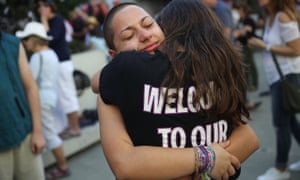Florida students have turned social media into a weapon for good

High schools have dances, they have cafeterias, they have midterm exams and, in the United States, they have shootings.
“Our school is having a shooting,” tweeted Heather, a student at Marjory Stoneman Douglas high school in Parkland, Florida, on the afternoon of Wednesday 14 February. “I’m not even kidding I’m about to die.”
Under normal circumstances, social media is a venue for teenagers to engage in the teenage tradition of treating quotidien events as matters of life and death. Our school is having tater tots for lunch I’m not even kidding I’m going to die … Our school is having sex ed workshops I’m not even kidding I’m going to die … Our school is having a pep rally I’m not even kidding I’m going to die.
But in the week since Nikolas Cruz walked into Heather’s school with an AR-15 and shot 17 people dead, the teenagers whose lives were upended by the shooting have used social media to upend this country’s ritualistic response to mass shootings. They have taken to Twitter and Snapchat and Instagram to do what teenagers do so well: make adults and our tolerance for an intolerable status quo look dumb and old.
This is social media at its best. From the Arab Spring to the Ferguson uprising to the shooting in Parkland, social media has been a cudgel for participants in real life events to wield against the ossified frameworks that give shape to our political discourse.
The discourse around mass shootings in the US prior to last week was well and truly ossified. As the Boston Globe illustrated with a front page column, articles about mass shootings can basically be written in advance. We all knew that the “thoughts and prayers” were coming; we all knew that the NRA would lay low, that politicians would invoke mental illness, and we all felt that nothing would ultimately change.
It took teenagers with smartphones and the guileless profanity of youth confronted with injustice to jostle us out of that studied complacency.
The Stoneman students have refused to allow the adult leadership in this country to follow its script of pious platitudes, exposing “thoughts and prayers” as the thoughtless tic that it has become, and advanced a powerful rebuke to those who would condescend to them. Going to school in a country with 88 guns for every 100 people is a matter of life and death, they have argued, and it is those who refuse to face this fact that are behaving like children.
The fervor of these young voices has been a welcome and invigorating jolt for those of us who had become inured to horror. Teenagers on social media are no panacea, however. The very openness of social media platforms that makes it possible for voices in the midst of a mass shooting to find an audience and shift our understanding of events also enables the multitude of bad actors who use the same platforms to sow uncertainty and confusion.
Within hours of the Parkland shooting, Russian bot networks were seeding Twitter with misinformation and divisiveness, the New York Times reported. YouTube’s search algorithm is promoting conspiracy mongering videos about students being “crisis actors”. The rightwing media is using social media to amplify attacks on schoolchildren.
Opponents of the students’ pro-gun-control message have and will continue to attempt to undermine the authenticity of the students’ voices. The disgraced political commentator Dinesh D’Souza used his own Twitter account to mock the teenagers’ dismay at the failure of a gun control law to pass. InfoWars and Gateway Pundit – far-right websites that traffic in conspiracy theories – tussled on Twitter over whose fake headlines were more fake.
An aide for a Florida state representative emailed a reporter for the Tampa Bay Times a statement claiming that two of the most vocal students were “actors that travel to various crisis when they happen”, citing a YouTube video as evidence. The aide has since been fired. That the professional staff of an elected official was susceptible to being duped in such a manner should be a warning to all of us of the power of misinformation to infect our media ecosphere.
Whether the Stoneman students will be able to maintain their authentic voices amid social media’s crisis of authenticity remains an open question. But for now, they have taken full advantage of the democratic nature of social media to push our democracy forward. It will be up to the adults to take the next steps and make sure their terrorized Tweets weren’t sent in vain.
source:-theguardian